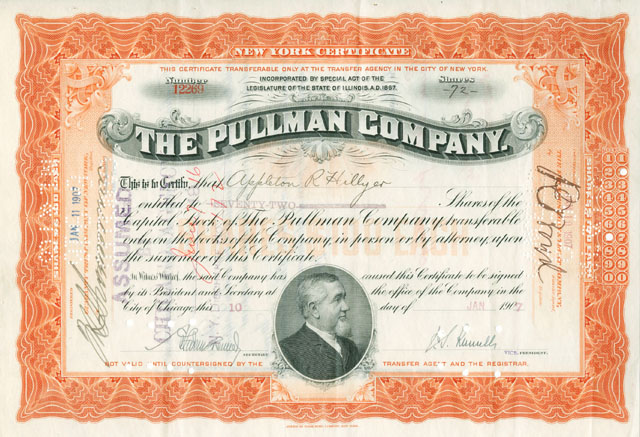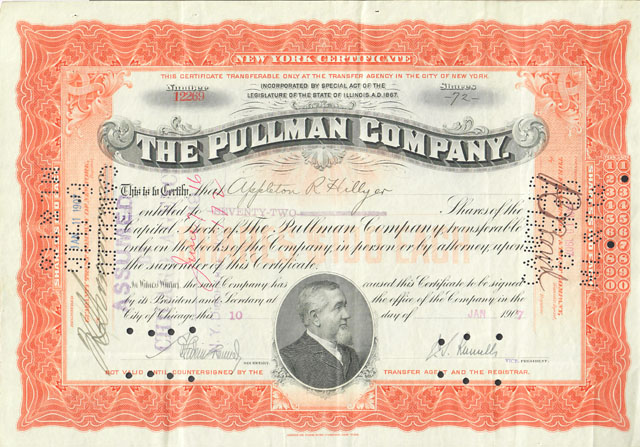Imported from: Google Blogger site
Original publish date: April 8, 2015
Updated minimally: January 22, 2024
How much do cancellations matter?
Before the advent of eBay, uncancelled certificates routinely attracted higher prices than those with cancellations. It was not a hard and fast rule, of course, but intermediate and advanced collectors usually sought uncancelled certificates when they could find them. When offered choices, those collectors tended to bid more for uncancelled examples.
 Typical image of certificate with hard-to-see cancellations.
Typical image of certificate with hard-to-see cancellations.
That pattern is harder to see today. It seems intermediate and advanced collectors still want uncancelled certificates for their collections. The question, though, is is how much they want to back up their desires with dollars.
If we limit our inquiry to items offered in live auctions from established auction companies, I think the answer is a guarded "yes." Those kinds of companies tend to offer better and rarer material. They are expert catalogers and experts in their fields. They know what their buyers want and they usually dedicate a fair amount of space to descriptions. By necessity, photos in printed auction catalogs are usually too small to see details such as cancellation. Sadly, even though all could offer larger images online, few companies do. On the bright side, auction house images of certificates are usually rectangular and properly exposed. Between their photos, descriptions and knowledge of their customers, today's high-class auction houses are normally able to realize relatively high prices for their items. Uncancelled items seem to command moderate premiums.
 Same certificate with black background allows cancellations to be seen more easily. This certificate was cancelled three different ways: eighth-inch circular holes in signature areas, pinhole pancellations near left and right borders, and ligh rubber stamp impression in blue.
Same certificate with black background allows cancellations to be seen more easily. This certificate was cancelled three different ways: eighth-inch circular holes in signature areas, pinhole pancellations near left and right borders, and ligh rubber stamp impression in blue.
EBay, on the other hand is an unfocused marketplace. It offers everything. Seller overburden collectors with loads of ultra-common certificates. Descriptions are typically minimal or non-existent. When sellers do offer descriptions, they tend to be off-topic extracts from Wikipedia that say nothing about certificates. Yes, today's eBay photos are notably larger than auction house images. Unfortunately, the quality of many images is still pathetic.
In this setting, I cannot detect evidence that cancellations affect eBay prices.
Yes, I agree with professional dealers who argue that uncancelled certificates SHOULD fetch higher prices. The problem is that eBay pricing behavior does not conform to that assumption.
Since I record prices every day, I can testify with absolute certainty that pricing on eBay is crazy. One day a certificate will sell for $30. A month later, a near identical certificate will sell for $100. A few weeks after that, bidding on another near-identical certificate will struggle to reach $20. There are rarely any visible reasons for such insane price swings.
The truth is that insane price swings are normal on eBay, so it is utterly impossible to quantify the effect of cancellation on prices. Any possible distinction is made greatly more difficult because so few sellers mention cancellations in their meager descriptions. Still, because I retain images from every sale, I can usually identify whether the items sold were cancelled or not when entering records into my database. For that reason, I can say with certainty that there is NO PREDICTABLE RELATIONSHIP between cancellation and prices on eBay.
Yes, I still estimate price differences between cancelled and uncancelled certificates in my catalog and will continue to do so. On average, I still believe that experienced collectors willingly pay more for uncancelled certificates. It is just that detecting those price differences on eBay is not possible.